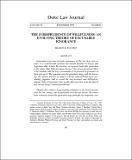| dc.description.abstract |
Ignorantia legis non excusat—ignorance of the law does not ex- cuse—is a centuries-old criminal law maxim familiar to lawyer and layperson alike. Under the doctrine, an accused finds little protection in the claim “But, I did not know the law,” for all are presumed either to be familiar with the law’s commands or to proceed in ignorance at their own peril. The ignorant must be punished along with the know- ing, the maxim teaches, to achieve a better educated and more law- abiding populace and to avoid the easy-to-assert and difficult-to- dispute claim of ignorance that would otherwise flow from the lips of any person facing criminal punishment. |

